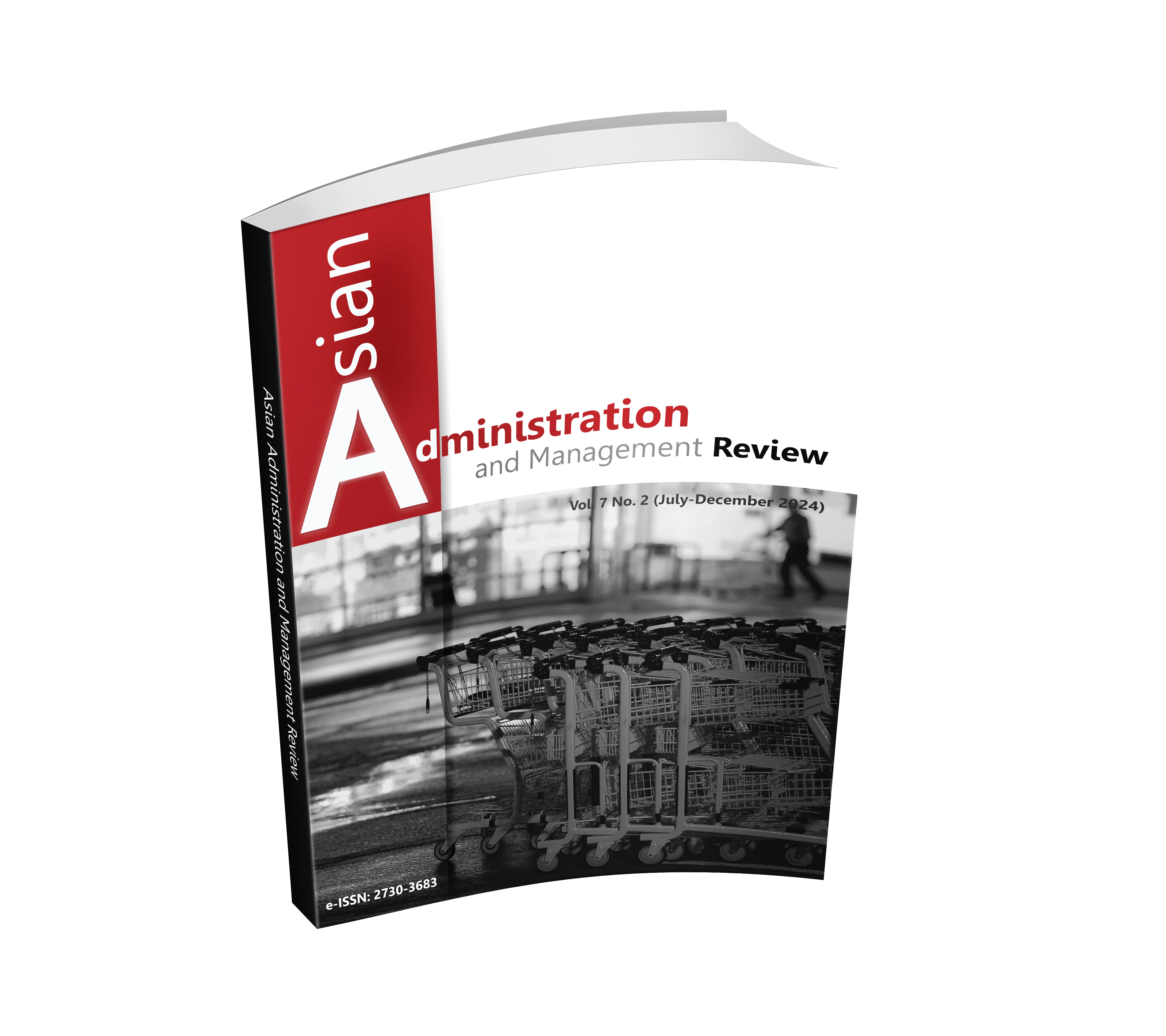TRANSFORMATIONAL LEADERSHIP AND TEACHER MOTIVATION INFLUENCING COLLEGE ENGLISH TEACHERS’ JOB PERFORMANCE IN GUANGXI HIGHER EDUCATION
DOI:
https://doi.org/10.14456/aamr.2024.37Keywords:
Job Performance, Transformative Leadership, Techer Motivation, Guangxi Higher EducationAbstract
This study aims to determine the relationship and effects between transformational leadership and teacher motivation on college English teachers’ job performance in Guangxi higher education. Utilizing a quantitative research approach, the study surveyed 400 administrators and college English teachers in Guangxi. The findings reveal teacher motivation demonstrated a strongly significant positive relationship with job performance. Additionally, a moderate positive relationship between transformational leadership and job performance. Multiple regression analysis showed that the model explained 14.5% of the variance in job performance. Based on the analysis, the job performance of college English teachers can be estimated using the following formula: Job Performance = 1.702 + 0.176 * Transformational Leadership + 0.282 * Teacher Motivation. The study also proposes strategies for improving teachers' job performance, applicable to both organizations and university principals.
Downloads
References
Amzat, I., Don, Y., Fauzee, S., Hussin, F., & Raman, A. (2017). Determining motivators and hygiene factors among excellent teachers in Malaysia: An experience of confirmatory factor analysis. International Journal of Educational Management, 31(2), 78-97.
Berhanu, K. (2023). Relationship between Pedagogical Leadership and Teachers’ Job Performance as Mediated by Organizational Commitment. International Journal of Learning, Teaching and Educational Research, 22(11), 243-258.
Brandmiller, C., Dumont, H., & Becker, M. (2020). Teacher Perceptions of Learning Motivation and Classroom Behavior: The Role of Student Characteristics. Contemporary Educational Psychology, 63, 101893.
Campbell, J. (2015). Identification and Performance Management: An Assessment of Change-Oriented Behavior in Public Organizations. Public Personnel Management, 44(1), 46-69.
Çetin, F., & Askun, D. (2019). The effect of occupational self-efficacy on work performance through intrinsic work motivation. Management Research Review, 41(2), 186-201.
Demir, A., & Budur, T. (2023). Work–life balance and performance relations during COVID 19 outbreak: a case study among university academic staff. Journal of Applied Research in Higher Education, 15(2), 449-472.
Dou, D., Devos, G., & Valcke, M. (2017). The Relationships between School Autonomy Gap, Principal Leadership, Teachers’ Job Satisfaction and Organizational Commitment. Educational Management Administration & Leadership, 45(6), 959-977.
Dutta, V., & Sahney, S. (2022). Relation of principal instructional leadership, school climate, teacher job performance and student achievement. Journal of Educational Administration, 60(2), 148-166.
Forson, J., Ofosu-Dwamena, E., Opoku, R., & Adjavon, S. (2021). Employee motivation and job performance: a study of basic school teachers in Ghana. Future Business Journal, 7, 30.
Johari, J., Tan, F., & Zulkarnain, Z. (2018). Autonomy, workload, work-life balance and job performance among teachers. International Journal of Educational Management, 32(1), 107-120.
K, J., & Ranjit, G. (2022). Explicating intrinsic motivation's impact on job performance: employee creativity as a mediator. Journal of Strategy and Management, 15(4), 647-664.
Kõiv, K., Liik, K., & Heidmets, M. (2019). School leadership, teacher’s psychological empowerment and work-related outcomes. International Journal of Educational Management, 33(7), 1501-1514.
Li, L., Hallinger, P., & Ko, J. (2016). Principal leadership and school capacity effects on teacher learning in Hong Kong. International Journal of Educational Management, 30(1), 76-100.
Nasra, M., & Arar, K. (2020). Leadership style and teacher performance: mediating role of occupational perception. International Journal of Educational Management, 34(1), 186-202.
Nelly, N., Prabowo, H., Bandur, A., & Elidjen, E. (2024). The mediating role of competency in the effect of transformational leadership on lecturer performance. International Journal of Educational Management, 38(2), 333-354.
Nurhidayat, A., Mulawarman, M., & Sunawan, S. (2024). Group Counseling with Motivational Interviewing Approach to Enhance Intrinsic Motivation and Academic Engagement. Jurnal Kajian Bimbingan dan Konseling, 9(2), 89-99.
Ocham, L., & Okoth, U. (2015). Head-teachers ' motivational practices in public secondary schools in Kenya. The TQM Journal, 27(6), 814-822.
Reina-Tamayo, A., Bakker, A., & Derks, D. (2018). The work engagement–performance link: an episodic perspective. Career Development International, 23(5), 478-496.
Renata, Wardiah, D., & Kristiawan, M. (2018). The Influence of Headmaster’s Supervision and Achievement Motivation on Effective Teachers. International Journal of Scientific & Technology Research, 7(6), 44-49.
Rofifah, S., Sirojuddin, A., Ma`arif, M., & Zuana, M. (2021). The Influence of Organizational Culture and Work Motivation on Teacher Performance at the International Standard School, Amanatul Ummah Mojokerto. Nidhomul Haq: Jurnal Manajemen Pendidikan Islam, 6(1), 27-40.
Rohim, S., Surip, M., Lubis, M., & Gafari, M. (2023). Leadership contribution and organizational commitment on the work achievement of the school principals and teachers in high schools in Medan. Cogent Education, 10(2), 2239595.
Smith, J., & Brown, R. (2023). Assessing the Impact of Intervention Strategies on Employee Performance: A Power Analysis. Journal of Applied Statistics, 45(3), 112-130.
Soto-Pérez, M., Sánchez-García, J., & Núñez-Ríos, J. (2020). Factors to improve job performance and school effectiveness. International Journal of Educational Management, 34(5), 805-822.
Sudha, A., Azam, S., & Tham, J. (2023). Transformational leadership and job performance of Maldives Civil Service employees, mediated by organisational commitment. International Journal of Public Sector Management, 36(3), 271-287.
Tian, J., Zhang, W., Mao, Y., & Gurr, D. (2022). The impact of transformational leadership on teachers' job burnout: the mediating role of social-emotional competence and student-teacher relationship. Journal of Educational Administration, 60(4), 369-385.
Tian, L., & Qin, Y. (2014). Construction and reflection on the theoretical model of teacher work motivation. Journal of Northeast Normal University (Philosophy and Social Sciences), 3, 206-209.
Tingle, E., Corrales, A., & Peters, M. (2019). Leadership Development Programs: Investing in School Principals. Educational Studies, 45(1), 1-16.
Wang, J., Kong, C., & Li, Q. (2015). An empirical study on the relationship between employees' achievement motivation and job performance: Taking self-efficacy as a mediating variable. Financial Theory and Practice Research, (01), 72-83.
Wang, N., Luan, Y., & Ma, R. (2024). Detecting causal relationships between work motivation and job performance: a meta-analytic review of cross-lagged studies. Humanities and Social Sciences Communications, 11, 595.
Zepeda, S. (2016). Instructional Supervision: Applying Tools and Concepts. 4th ed. New York: Routledge.
Zhu, S. (2016). Study on the relationship between employee work motivation and job performance in the fast-moving consumer goods industry. Master’s Thesis, East China Normal University.

Downloads
Published
How to Cite
Issue
Section
License
Copyright (c) 2024 Authors

This work is licensed under a Creative Commons Attribution-NonCommercial-NoDerivatives 4.0 International License.











.png)


